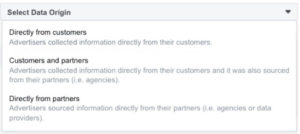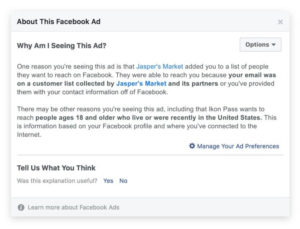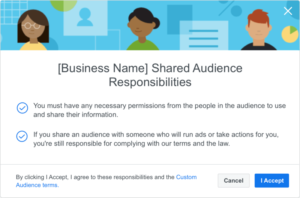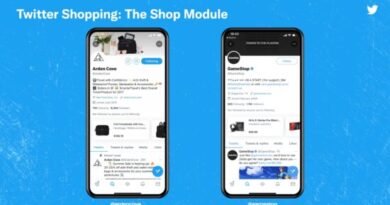Facebook updates Custom Audience list requirements to create more ad transparency
Facebook is making changes to the way advertisers manage their Custom Audience lists to give users more transparency about why they see the ads that are displayed in their News Feed.
Beginning July 2, advertisers will have to specify the origin of the audience’s information when uploading a Custom Audience list (the contact lists advertisers upload to Facebook in order to target ads).
“When uploading a customer file, advertisers will need to indicate whether the information was collected directly from people, provided by partners, or a combination of the two,” writes Facebook.

This new requirement will allow users to view more specific information around why an ad is displayed in their News Feed. When a user clicks on the “Why am I seeing this?” in an ad’s drop-down menu, they will be able to see the source behind the Custom Audience list information — and if the advertiser reached them via their phone number or email address.

Not only will advertisers now be required to specify where they’re getting information from — anyone on the advertiser’s account team who manages Custom Audience lists on the platform must agree to Facebook’s new rules.
“We will also now require everyone on an ad account uploading Custom Audiences to accept the terms, rather than only requiring this from the admin on the account,” says Facebook.
Also, starting on July 2, parties that share customer files to build Custom Audience lists — for example, a brand on Facebook that shares its customer list with its ad agency — will need to confirm an audience-sharing relationship via Facebook’s Business Manager tool, with both parties agreeing to Facebook’s Custom Audience terms.

These latest efforts by Facebook are designed to deliver more accountability and transparency around advertising — something the company has been promising since news broke that Cambridge Analytica had used an app on Facebook to harvest and exploit user data. While the updates are a result of Facebook’s user privacy crisis, they come at a time when the EU’s GDPR guidelines are forcing all advertisers to reconsider how they engage with consumers — and how platforms like Facebook can better safeguard user rights.

Dive deep into marketing technology issues and ideas at MarTech®
Join the martech community October 1-3 in Boston, MA for vendor-agnostic, graduate-level marketing technology and operations insights. If you’re responsible for driving digital transformation in this software-powered world, then you don’t want to miss out on MarTech. View rates and register today!


